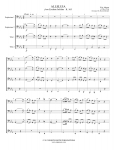Shop Selection
Categories
Welcome back!
Last viewed:
Composer:
Delibes, Léo Arranger:
Semeraro, Donato Setting:
Concert Band
Genre:
Klassik • Transcriptions Type of Product:
Full Score • Stimmensatz Introduction et Valse, Czardas, Mazurka
Coppélia, a ballet in two acts and three scenes, was premiered at the Opéra National in Paris on 25 May 1870. Despite its early success, performances were interrupted because of the Franco-Prussian War and the siege of Paris in 1870-1871, and also because of the death from smallpox of the young principal ballerina, Giuseppina Bozzacchi, on her 17th birthday. This ballet represented a courageous break with references to supernatural and ethereal spirits so dear to the Romantic esthetic, to address instead a world of adventure. Swanhilde sees, on the balcony of Dr. Coppélius, a beautiful girl: is she the daughter of Coppélius that no one has ever seen? So, with a series of adventures, Swanhilde and her girlfriends, taking advantage of his absence, manage to enter into the house of Dr. Coppélius, a toy manufacturer and a magician. Here, they discover that Coppélia, the beautiful daughter, is nothing else but a mechanical doll. Meanwhile Franz, the boyfriend of Swanhilde, sneaks into the house through the balcony. The sudden return of Coppélius scares away the kids: only Swanhilde (hidden behind a curtain) and Franz remain. Coppélius is able to sedate Franz, who has since declared his love for Coppélia and, laying him close to the mechanical doll he tries, thanks to his magic, to take Franz’s spirit and transfer it to Coppélia. Swanhilde is able to intervene and wakes Franz; she tells him about the deception and escapes with him, while Coppélius disconsolately embraces his mechanical doll. The ballet ends with the marriage of Swanhilde and Franz. Léo Delibes (1836 - 1891) was a student of Adolphe Adam at the Paris Conservatoire. The composer of several operettas, he reached success with the ballet Coppélia. He wrote other ballets, among which the best known are Sylvia and La Source, and several operas including Lakmé.
Coppélia, a ballet in two acts and three scenes, was premiered at the Opéra National in Paris on 25 May 1870. Despite its early success, performances were interrupted because of the Franco-Prussian War and the siege of Paris in 1870-1871, and also because of the death from smallpox of the young principal ballerina, Giuseppina Bozzacchi, on her 17th birthday. This ballet represented a courageous break with references to supernatural and ethereal spirits so dear to the Romantic esthetic, to address instead a world of adventure. Swanhilde sees, on the balcony of Dr. Coppélius, a beautiful girl: is she the daughter of Coppélius that no one has ever seen? So, with a series of adventures, Swanhilde and her girlfriends, taking advantage of his absence, manage to enter into the house of Dr. Coppélius, a toy manufacturer and a magician. Here, they discover that Coppélia, the beautiful daughter, is nothing else but a mechanical doll. Meanwhile Franz, the boyfriend of Swanhilde, sneaks into the house through the balcony. The sudden return of Coppélius scares away the kids: only Swanhilde (hidden behind a curtain) and Franz remain. Coppélius is able to sedate Franz, who has since declared his love for Coppélia and, laying him close to the mechanical doll he tries, thanks to his magic, to take Franz’s spirit and transfer it to Coppélia. Swanhilde is able to intervene and wakes Franz; she tells him about the deception and escapes with him, while Coppélius disconsolately embraces his mechanical doll. The ballet ends with the marriage of Swanhilde and Franz. Léo Delibes (1836 - 1891) was a student of Adolphe Adam at the Paris Conservatoire. The composer of several operettas, he reached success with the ballet Coppélia. He wrote other ballets, among which the best known are Sylvia and La Source, and several operas including Lakmé.
The following options can be choosen to configure this product:



